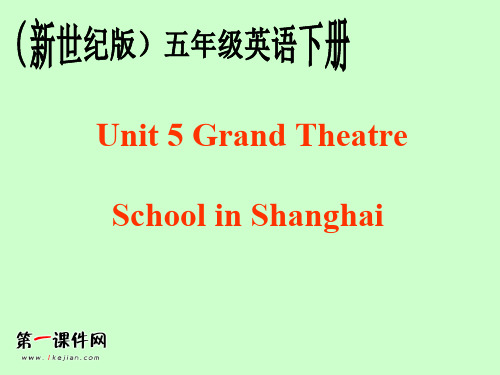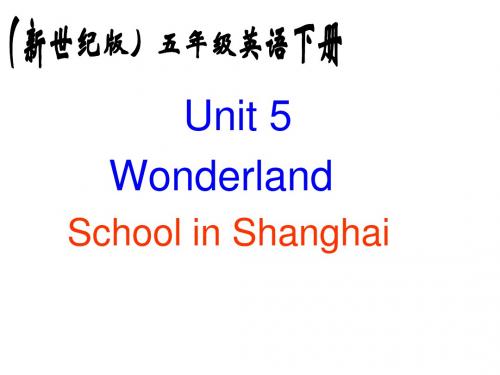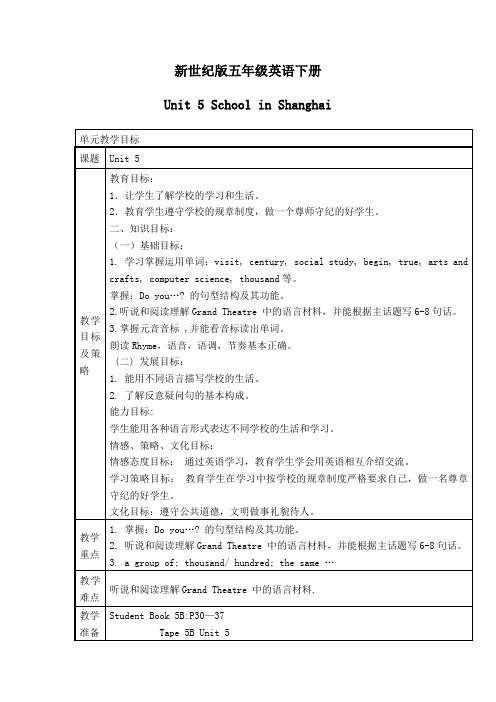五年级英语下册 Unit 5 School in Shanghai(1)教案 新世纪版
- 格式:doc
- 大小:88.00 KB
- 文档页数:5


上海版小学五年级英语下册Unit 1: My DayUnit 2: My FamilyIn this unit, students will learn vocabulary related to family members and practice talking about their own families. They will also learn to use possessive pronouns to describe family relationships.Unit 3: Seasons and WeatherIn this unit, students will learn vocabulary related to seasons and weather. They will practice describing different types of weather and talking about their favorite season. They will also learn to use adjectives to describe weather conditions.Unit 4: Food and DrinksIn this unit, students will learn vocabulary related to food and drinks. They will practice ordering food in a restaurant and discussing their eating preferences. They will also learn to use countable and uncountable nouns correctly.Unit 5: Hobbies and ActivitiesIn this unit, students will learn vocabulary related to hobbies and activities. They will practice talking about their own interests and discussing their favorite activities. They will also learn to use the present continuous tense to describe ongoing actions.Unit 6: My SchoolIn this unit, students will learn vocabulary related to school subjects, facilities, and routines. They will practice talking about their school life and discussing their favorite subjects. They will also learn to use prepositions to describe locations.Unit 7: Holidays and CelebrationsIn this unit, students will learn vocabulary related to holidays and celebrations. They will practice talking about different holiday traditions and describing their favorite celebrations. They will also learn to use adverbs of frequency to talk about how often they celebrate certain holidays.Unit 8: Transportation以上是《上海版小学五年级英语下册》的简要内容介绍。


上海牛津五年级英语Unit 1: My School LifeIn this unit, we will learn about different aspects of school life, including subjects, activities, and routines. We will also practice using vocabulary related to time and daily schedules. Let's dive in!1.1 SubjectsIn this section, we will explore various subjects that we study in school. We will learn how to express preferences and talk about our favorite subjects. Through interactive exercises, we will also improve our reading, writing, listening, and speaking skills.1.2 School ActivitiesIn this part, we will discover the different activities and events that take place in our school. We will discuss extracurricular clubs, sports competitions, and school trips. Additionally, we will practice expressing our opinions and feelings about these activities.1.3 Daily RoutinesHere, we will focus on describing our daily routines, including getting up, having breakfast, going to school, attending classes, and doing homework. We will learn how to use time expressions and adverbs to discuss the sequence of events in a day.Unit 2: My Family and FriendsIn this unit, we will explore the topic of family and friends. We will learn vocabulary related to family members, describe physical appearances, and share information aboutour friends. Through engaging activities, we will enhance our communication skills.2.1 Family MembersIn this section, we will learn how to introduce different family members and talk about their relationships. We will also practice using possessive pronouns to show ownership. Through role-play exercises, we will become confident in describing our own families.2.2 Physical AppearanceHere, we will learn how to describe people's physical appearances using appropriate adjectives. We will also learn how to ask and answer questions about physical features. By engaging in pair and group discussions, we will improve our speaking and listening skills.2.3 My FriendsIn this part, we will discuss friendships and learn vocabulary related to friends. We will explore the qualities of a good friend, share stories about our friends, and describe their personalities. Through creative writing activities, we will develop our writing skills.Unit 3: Our WorldIn this unit, we will broaden our knowledge about the world around us. We will learn about different countries, cultures, and famous landmarks. Through engaging tasks and multimedia resources, we will gain a deeper understanding of the global community.3.1 Countries and CulturesIn this section, we will explore various countries and their unique cultures. We will learn about different traditions, customs, and celebrations from around the world.By presenting on a chosen country, we will enhance our research and presentation skills.3.2 Famous LandmarksHere, we will discover famous landmarks from different countries and learn interesting facts about them. We will also practice giving directions using prepositions and descriptive language. Through group discussions, we will develop our speaking and listening abilities.3.3 Environmental IssuesIn this part, we will raise awareness about environmental issues and the importance of conservation. We will learn vocabulary related to nature, pollution, and sustainability. By engaging in debates and reflections, we will strengthen our critical thinking and persuasive skills.With these engaging and interactive units, we will enhance our English language proficiency while exploring various aspects of school life, family and friends, and the wider world. Let's embark on an exciting learning journey together!(Note: This document is a fictional representation and doesn't contain any actual content from the "上海牛津五年级英语" document.)。


人教版PEP英语五年级下册Unit 5 知识点、1-6课时课课练含答案Unit 5 Whose dog is it? 知识点一、核心词汇1.名词性物主代词: mine 我的yours 你(们)的his 他的hers 她的theirs 他们的;她们的;它们的ours 我们的2.动词: climbing (正在)攀登;攀爬eating (正在)吃playing (正在)玩耍jumping (正在)跳drinking (正在)喝(水)sleeping (正在)睡觉二、了解词汇1. 单词:each 每一;各个other 其他excited 兴奋的;激动的like 像……那样2. 短语: each other 相互三、核心句型1.The yellow picture is mine. 那幅黄颜色的画是我的。
解读:这是表达某物是某人的句型。
举一反三: This bag is hers. 这个包是她的。
2.Are these all ours? 这些都是我们的画吗? 解读:这是询问某物是不是某人的一般疑问句。
举一反三: — Is the pencil yours? 这是你的铅笔吗?— Yes, it is. 是的。
3.— Whose is it? 它是谁的? — It ’s Zhang Peng ’s. 是张鹏的。
解读:当表示物品的从属关系时用名词性物主代词或名词所有格来表示。
人称代词表名称主格 宾格 形容词性 物主代词 名词性 物主代词I(我) me(我) my(我的) mine(我的) you(你;你们) you(你;你们) your(你的;你们的) yours(你的;你们的)he(他) him(他) his(他的) his(他的) she(她)her(她) her(她的) hers(她的) it(它) it(它) its(它的) its(它的) we(我们) us(我们) our(我们的) ours(我们的) they [他(她;它)们]them [他(她;它)们]their [他(她;它)们的]theirs [他(她;它)们的]4.— Is he drinking water? 他在喝水吗?— No, he isn’t. He’s eating. 不,不是。
上海五年级下册英语第五课作文例文As the fifth lesson in the Shanghai fifth grade English textbook, the topic of the lesson is about "My Hobbies". In this lesson, students are encouraged to express their own hobbies and interests in English, and to learn how to write a short composition about their favorite activities.In this lesson, the example essay provided for the students is about a student named Lily, who loves painting. In her essay, Lily talks about how she started painting, what she likes to paint, and why she enjoys this hobby. She also describes the process of creating a painting and the satisfaction she feels when she finishes a piece of artwork.Lily's essay is a great example for the students to learn from. It is well-organized, with a clear introduction, body, and conclusion. She uses descriptive language to express her feelings and experiences, and she also includes some personal details to make her essay more interesting and relatable.In the introduction, Lily briefly introduces her hobby of painting and explains why she likes it. She then goes on to describe how she first became interested in painting and how she developed her skills over time. She talks about the different subjects she likes to paint, such as flowers, animals, and landscapes, and she explains why she finds each of these subjects inspiring.In the body of the essay, Lily describes the process of creating a painting in detail. She talks about how she chooses a subject, sketches the outline, mixes the colors, and adds details to bring the painting to life. She also explains how she feels when she is painting, and how she knows when a painting is finished.In the conclusion, Lily reflects on the satisfaction she gets from painting and encourages others to pursue their own hobbies and interests. She ends her essay with a positive and inspiring message, leaving a strong impression on the reader.Overall, Lily's essay is a great example for the students to learn from. It demonstrates how to write a well-organized and engaging composition about one's hobbies, and it alsoshows the importance of using descriptive language and personal details to make the essay more interesting. By following Lily's example, the students can improve their English writing skills and learn how to express themselves more effectively.。
新世纪版五年级英语下册Unit 5 School in Shanghai一、教育目标:教育学生从小热爱学习,热爱自己美丽的家园。
教育学生自觉遵守校规,从而使校园生活更完美。
二、知识目标:基础目标:学习本单元单词:visit, century, social studies, begin, true, computer science, arts and crafts and thousand复习巩固一般现在时的句型结构,并与一般将来时进行比较。
听说和阅读理解Grand Theatre 中的语言材料,并能根据主话题写6-8句话。
掌握元音音标朗读Rhyme语音、语调、节奏基本正确。
发展目标:能用英语来表达自己的学校生活,并表达自己对学校的热爱之情。
根据自己学校的实际情况,写一篇有关学校和学校生活的短文,并在班级中交流。
三、能力目标:学生能用英语描述自己的学校和学校生活,以体现学生对学校和学习的热爱。
四、情感、策略和文化目标:1 .情感态度:养成良好的学习习惯。
2. 学习策略: 培养小组合作学习,在充满合作机会的个体和群体的交往中,学会沟通,互助和分享。
3. 文化目标:了解西方国家的校园风貌和学生的学习生活。
五、教学资源:Student’s Book 5B P30----P37 cassette 5B unit 5, Work Book 5B P35---P42, pictures of signs, teaching transparencies.六、教学时间:七课时。
(其中5课时新授,2课时练习和复习,练习册随教学进度完成。
)Lesson plan (1) WonderlandI. Pre-task preparation1. Daily talk.2. Ask students to come to the front to talk about their favourite subjectsII. While-task procedureLearn the new words (social studies, computer science, arts and crafts,)Here’s a timetable. It is our timetable for next term. What subject will we take? Show a timetable of a school(Review English, Chinese, science, maths, art, history, subject and so on.)What else will we learn? (social studies, computer science, arts and crafts)New words (visit, century, hundred, thousand, true, begin)This term we will visit New Century Primary School. Please guess: Is the school big or small? (big)That’s true. The school has one hundred teachers and one thousand students. And the school is modern. At 7:45 the students of this school begin to have their morning classes. According to these new words. Ask students to imitate the phonetic symbols.Play the cassette: Wonderland. Students listen and follow with their books open.Play the cassette again. Students listen and repeat.Let students ask some questions about the new words.III. Post-task activities.Ask the students to remember the new words as soon as possible.Do exercises of student’s Work Book on Page 37 (3) (4)Divide the students into groups of four. Ask them to make sentences with the new words. Invite individuals to talk the sentences they have made.Lesson plan (2) FarmlandPre-task preparationReview the sentences of wonderlandTopic: my school or my school life. (Invite students to come to the front to talk about it.)While-task procedure.Expand the English phrasesFor example:do some reading 1) read books 2) read newspapers 3) read English or Chinese.do cleaning 1) clean the classroom 2) clean the window 3) clean the deskdo some listening ….. do writing … do washing …. do housework ….do some shopping …. do some cleaning ….Show the pictures of the farmland, and make dialogues with students.I’m a reporter. I want to interview you about your school life.3. Work out a form of interview.What questions can you ask with the English phrases above?Such as: Do you do some reading in you school every day?Do you do listening exercises at school every day?Do you play ball games after school?4. Ask students to discuss how to answer questions above.5. Play the cassette: Mini dialogue, Student listen and follow.6. Ask students to act out the dialogue.Encourage the students to make dialogues with their own words. Post-task activities:1. Fill in the form. What questions do you want to ask?Students interview their friends about school.Tell your classmates about your survey results.Lesson plan (3) Grand TheatrePre-task procedure1. Ask and answer questionsHow many students are there in you school?What subjects do you take at school?How long is your school day?When do you play sports?2. Topic: my school lifeWhile-task procedureShow the title of the text. (School in Shanghai)What school does the text talk about?(New Century Primary School). Show the students’ q uestions on the board, then listen to the tape.Who is visiting New Century Primary School?(a group of students from America)Is New Century Primary School in Shanghai big?How many students are there in the school?(over one thousand students)Are all Chinese school in Shanghai big?(most)Do all students take the same subjects?What subjects do they take?When do their morning lessons begin?When do they finish their school?How long is the school day?When do the students play sports?3. Read and make the students understand some phrasesnew Century Primary School in Shanghaia group of students from Americaall Chinese schoolover one thousandsmost primary schools most oftake the same subjectsfinish school get homework each week4. Read questions and answer5. Play the cassette. Students listen and follow the tape6. Divide the students into groups of three. Practice talking about the text.7. Invite student to act out the text in front of the class.Post-task activities1. Suppose you are a student of New Century Primary School in Shanghai, Fill in the blankand retell the text.____________from America is visiting our school. Our school is _____big. There are________________students in it. But ____________aren’t usually so big. We usually_________________. Our school day is ____________. It begins ________ and ________at threethirty. We usually _______________ homework. We have two PE lessons ________. After schoolwe ______________.2. According to the questions in your work book, on page 40,make a dialogue about your schoolor school life.3. Write about your school. Workbook on page 42.Lesson plan (4) DisneylandPre-task preparation1. Ask and answer questions about the text.2. Ask and answer question about your own school.3. Students listen to the rhyme and repeatTry to understand the rhyme and practice.While- task procedure.Pair work on page 35. Students listen to the tape carefully.Play the cassette again. Students Listen and repeat.Practice the pair work with his or her partner.Encourage the students to make a similar dialogue or a longer dialogue.Invite some groups act out the dialogue in the front of classroom.Music boxFirst let students listen to the tape, then fill in the blanks.sh__p sh___t n__t n____th d___ll d____fr___g fl_____ c__st c____n b___x b____nkid’s palaceStudents read the passage by themselves, then ask questions which they don’t understand. Read and matchPost- task activities.Page 39 in Work BookStudents finish the work individually.Ask a student to write the keys on the board. The others check the answer.Students try to complete the following dialogue on Page 41 in Work Book, then have a check...。
新世纪版五年级英语下册Unit 5 School in Shanghai一、教育目标:教育学生从小热爱学习,热爱自己美丽的家园。
教育学生自觉遵守校规,从而使校园生活更完美。
二、知识目标:基础目标:学习本单元单词:visit, century, social studies, begin, true, computer science, arts and crafts and thousand复习巩固一般现在时的句型结构,并与一般将来时进行比较。
听说和阅读理解Grand Theatre 中的语言材料,并能根据主话题写6-8句话。
掌握元音音标朗读Rhyme语音、语调、节奏基本正确。
发展目标:能用英语来表达自己的学校生活,并表达自己对学校的热爱之情。
根据自己学校的实际情况,写一篇有关学校和学校生活的短文,并在班级中交流。
三、能力目标:学生能用英语描述自己的学校和学校生活,以体现学生对学校和学习的热爱。
四、情感、策略和文化目标:1 .情感态度:养成良好的学习习惯。
2. 学习策略: 培养小组合作学习,在充满合作机会的个体和群体的交往中,学会沟通,互助和分享。
3. 文化目标:了解西方国家的校园风貌和学生的学习生活。
五、教学资源:Student’s Book 5B P30----P37 cassette 5B unit 5, Work Book 5B P35---P42, pictures of signs, teaching transparencies.六、教学时间:七课时。
(其中5课时新授,2课时练习和复习,练习册随教学进度完成。
)Lesson plan (1) WonderlandI. Pre-task preparation1. Daily talk.2. Ask students to come to the front to talk about their favourite subjectsII. While-task procedureLearn the new words (social studies, computer science, arts and crafts,)Here’s a timetable. It is our timetable for next term. What subject will we take? Show a timetable of a school(Review English, Chinese, science, maths, art, .)What else will we learn? (social studies, computer science, arts and crafts)New words (visit, century, )This term we will visit New Century Primary School. Please guess: Is the school big or small? (big)That’s true. The school . At 7:45 the students of this school begin to and follow with their books open.Play the cassette again. Students listen and repeat.Let students ask some questions about the new words.III. Post-task activities.Ask the students to remember the new words as soon as possible.Do exercises of student’s Work Book on Page 37 (3) (4)Divide the students into groups of four. Ask them to make sentences with the new words. Invite individuals to talk the sentences they plan (2) FarmlandPre-task preparationReview the sentences of wonderlandTopic: my school or my school life. (Invite students to come to the front to talk about it.)While-task procedure.Expand the English phrasesFor example:do some reading 1) read books 2) read newspapers 3) read English or Chinese.do cleaning 1) clean the classroom 2) clean the window 3) clean the deskdo some listening ….. do writing … do washing …. do you ask with the English phrases above?Such as: Do you do some reading in you school every day?Do you do listening exercises at school every day?Do you play ball games after school?4. Ask students to discuss and follow.6. Ask students to act out the dialogue.Encourage the students to make dialogues with their own words.Post-task activities:1. Fill in the form. What questions do you want to ask?For exampleStudents interview their friends about school.Tell your classmates about your survey results.Lesson plan (3) Grand TheatrePre-task procedure1. Ask and answer questionsHow many students are there in you school?What subjects do you take at school?How long is your school day?When do you play sports?2. Topic: my school lifeWhile-task procedureShow the title of the text. (School in Shanghai)What school does the text talk about?(New Century Primary School). Show the students’ questions on the board, then listen to the tape.Who is visiting New Century Primary School?(a group of students from America)Is New Century Primary School in Shanghai big?How many students are there in the school?(over one thousand students)Are all Chinese school in Shanghai big?(most)Do all students take the same subjects?What subjects do they take?When do their morning lessons begin?When do they finish their school?How long is the school day?When do the students play sports?3. Read and make the students understand some phrasesnew Century Primary School in Shanghaia group of students from Americaall Chinese schoolover one thousandsmost primary schools most oftake the same subjectsfinish school get and follow the tape6. Divide the students into groups of three. Practice talking about the text.7. Invite student to act out the text in front of the class.Post-task activities1. Suppose you are a student of New Century Primary School in Shanghai, Fill in the blankand retell the text.____________from America is visiting our school. Our school is _____big. There are________________students in it. But ____________aren’t usually so big. We usually_________________. Our school day is ____________. It begins ________ and ________at three thirty. We usually _______________ your work book, on page 40,make a dialogue about your school or school life.3. Write about your school. Workbook on page 42.Lesson plan (4) DisneylandPre-task preparation1. Ask and answer questions about the text.2. Ask and answer question about your own school.3. Students listen to the rhyme and repeatTry to understand the rhyme and practice.While- task procedure.Pair work on page 35. Students listen to the tape carefully.Play the cassette again. Students Listen and repeat.Practice the pair work with the front of classroom.Music boxFirst let students listen to the tape, then fill in the blanks.sh__p sh___t n__t n____th d___ll d____fr___g fl_____ c__st c____n b___x b____nkid’s palaceStudents read the passage by themselves, then ask questions which they don’t understand. Read and matchPost- task activities.Page 39 in Work BookStudents finish the work individually.Ask a student to write the keys on the board. The others check the answer.Students try to complete the following dialogue on Page 41 in Work Book, then have a check...。